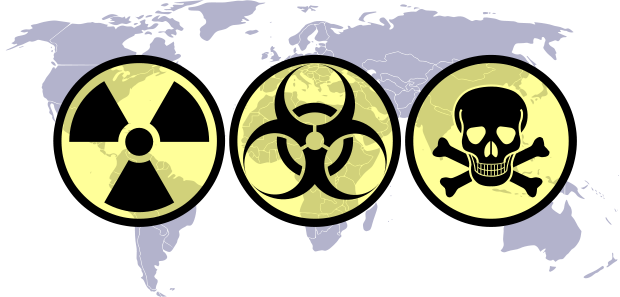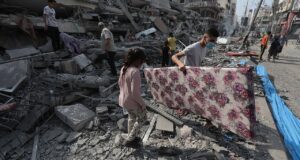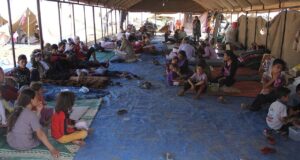Original article published in The Spectator, 17th September 2013.
The age-old question cui bono (who benefits) should be asked regarding Russia and the United States’ diplomatic agreement on the international control and subsequent destruction of Syria’s chemical weapons. Amidst the hopefulness and optimism, the answers to this question prove disturbing. We must remember that it might take a disaster even worse than 100,000 dead and the use of WMDs against civilians before this light touch regulation of crimes against humanity is shown to be immoral and flawed.
Who benefits? The Syrian government’s response is indicative, with Ali Haider, who has the Kafkaesque title of Minister of National Reconciliation, claiming ‘a victory for Syria won thanks to our Russian friends’. The Assad regime clearly feels it is has benefitted by avoiding potentially devastating US and French military attacks. It may calculate that since the West has no stomach to intervene when its own red lines on WMDs are crossed, further ‘conventional’ war crimes can be committed with impunity, particularly given that these were never defined by the West as ‘red lines’. The regime may conclude that it could get away with subsequent ‘small scale’ uses of chemical weapons if facing an existential threat. All right-minded people hope that the Syrian regime accedes to the US/Russian timetable, but it is vital that at a bare minimum, a ‘cat-and-mouse’ between UN inspectors and the regime, as in Iraq in the 1990s and early 2000s, is avoided.
Having seemingly curtailed US plans for a military strike through shrewd diplomatic manoeuvring, Russia has benefitted, and may now conclude that it can more easily diminish the ability of the United States to determine the outcome of important matters of international security. Ever since Libya, Putin has aimed to emasculate Western influence and weaken the growing norm of the Responsibility to Protect. He has now seen that he can manipulate both Western leaders and their publics to this end.
Can it be said, then, that diplomacy has benefitted? Prior to the recent agreement, John Kerry said ‘This is our Munich moment. This is our chance to join together and pursue accountability over appeasement’. Of course the stakes are not as high for international peace as they were then, but we should recall that Chamberlain’s 1938 Munich agreement was met with widespread jubilation, for having averted war. A diplomatic agreement is rarely preferable if it sanctifies the status quo created by a vicious regime’s aggression, merely postponing a bigger disaster in the future which may require our action.
Has democracy itself benefitted, now that the general public’s distaste for military action has been transmitted through opinion polls and more importantly, through Parliament, to veto the power of the executive to pursue this part of its foreign policy? Democracies are not strengthened but weakened when human rights to ‘life, liberty and security of person’, as per the Universal Declaration of Human Rights, let alone so-called ‘democratic rights’, are not upheld.
Have the United Nations and the concept of international law benefitted? Whether we like it or not, by acquiescing to President Putin’s diplomatic strategy, it is easier for Putin to argue that his self-interested obstructionism at the UN (which prevented the Security Council even from issuing the mildest rebuke to the Assad regime over the last two years) is ‘not protecting the Syrian government, but international law’ and that Western intervention ‘could throw the entire system of international law and order out of balance’. Years if not decades of work establishing the doctrine of humanitarian intervention and of the Responsibility to Protect are being undermined before our eyes. Putin’s triumph has bolstered the view that international law and the UN exist only to protect what he referred to as the ‘balance’ of ‘international law and order’, namely that the so-called rights of great powers and dictatorships should take preference over those human rights of civilians. We cannot truly see benefit in the ossification of structures that lead to deliberate or accidental inaction in light of genocides such as that against the Kurds in Iraq, or in Bosnia, Rwanda and Darfur?
Amidst this gloom, there is cause for optimism given that John Kerry and Sergei Lavrov have committed to meeting in New York later this month to consider rekindling the ‘Geneva 2’ peace talks. However, the facts on the ground for Syria’s civilians must tend towards pessimism. Assad continues to monopolise and use heavy weaponry and air power; UN Secretary General Ban Ki-moon has said that the Syrian regime ‘has committed many crimes against humanity’; a medical emergency is in full flow and conditions are deteriorating daily; and the refugee crisis is deepening. What is proposed does not solve any of this. It may tackle the WMD issue, but in the absence of other measures, is another iteration of the light touch regulation of crimes against humanity that has persisted since the UN’s inception. It is understandable and perhaps even laudable that human nature recoils at military action and tends towards a minimalist approach. As we discovered with the international financial crisis from 2008 onwards, the inherent weakness and moral flaws of light touch regulation only became obvious after a cataclysmic event. It is to be hoped that this maxim can be proved without the needless death of countless more innocent men, women and children in Syria.
 Human Security Centre Human Rights and International Security Research
Human Security Centre Human Rights and International Security Research




